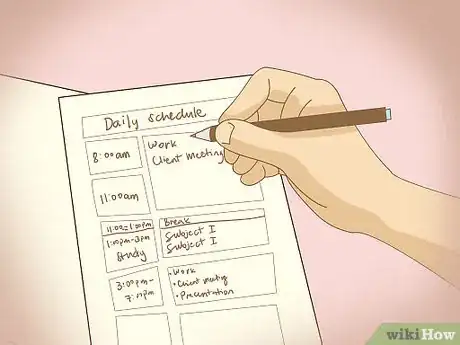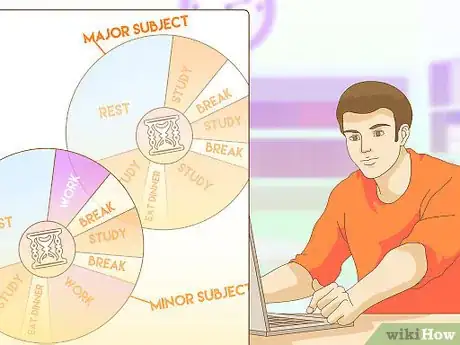This article was co-authored by Jai Flicker. Jai Flicker is an Academic Tutor and the CEO and Founder of Lifeworks Learning Center, a San Francisco Bay Area-based business focused on providing tutoring, parental support, test preparation, college essay writing help, and psychoeducational evaluations to help students transform their attitude toward learning. Jai has over 20 years of experience in the education management industry. He holds a BA in Philosophy from the University of California, San Diego.
wikiHow marks an article as reader-approved once it receives enough positive feedback. In this case, 85% of readers who voted found the article helpful, earning it our reader-approved status.
This article has been viewed 35,413 times.
Many distance learners (students taking classes while not physically present at the host college or university) need to balance several responsibilities at once. These may include working full-time, caring for young children, serving in active duty military roles, etc. Having so many obligations can make it difficult to find time to study. If you are a distance learner seeking advice for scheduling time to study for your classes, check out this guide.
Steps
Managing Your Schedule
-
1Determine what you need to get done. Before scheduling study time, it is important that you are aware of all the requirements of your various classes. Use your course calendars (usually provided in some form with the syllabus) to figure out what assignments are due each week. Don't forget to include tests and exams!
- It may help to write everything down and group it by day or week. This way you won't have to flip between multiple class syllabi in order to see what is due on any given day.
- If you do not have a syllabus or class schedule, ask your course instructor to give you as much information as possible about the general rhythm and organization of the course. Most instructors have their courses planned out before they even begin, so your teacher likely already has this information available.
-
2Create a plan. Once you have figured out what you need to get done each day or week, you can begin to make your study schedule. To do this, you will need to account for all your personal obligations, such as work, picking your kids up from school, medical appointments, etc. Make a schedule that first incorporates those things you can't easily adjust.
- Don't forget to factor in things that are important to you but might not necessarily be obligations. This could include a workout class, movie night with your family, or time devoted to a hobby or craft. You will maximize your productivity if you balance your studies with fun activities!
- Keep in mind that you can always make adjustments if you find that your plan isn't working. You can even scrap it altogether if necessary -- you are not bound by your first attempt.
Advertisement -
3Prioritize your requirements. In developing a study schedule, you should identify those tasks or assignments that are most important, especially if you have a hard time fitting in all your studying in the amount of time you have available. For example, if you have weekly assignments due for one class that are worth almost as much as the class exams, carve out time specifically for these each week to ensure you get them done.
- It may not always be easy to identify the "important" requirements for your classes. After all, everything is important if you want to do well! Try to prioritize those tasks that will have the greatest impact on your grade.
- Don't forget that some things that are required but not "due" may also be important. This might include assigned readings, which you are not graded on but will be important for you to learn the material and do well on the exams.
-
4Be as detailed as possible with your study schedule. It is not good enough to simply set aside 2 hours for studying. Carve out specific time frames for each task you need to accomplish on a given day. Being specific with your schedule will make you less likely to skip important tasks or accidentally take up all your study time with one assignment.
- Make sure you account for minor distractions, bathroom breaks, and the like when creating your schedule, otherwise you could be thrown off by unplanned interruptions.
- It is okay to break up your study sessions into multiple sessions per day if this works best for you. For example, you can devote an hour to studying before dinner and two hours afterwards. Just make sure the start and stop times are clearly defined in your schedule.
-
5Start slow. Don't give yourself too much to handle right out of the gate. If you aren't able to follow through with your study plan in the very first week of school, you're likely to get frustrated. This is a recipe for failure. Make sure you can handle things before cranking up the intensity.
- Begin with assigning yourself a 2 hour study block every other night. If this isn't enough time to get done what you need to do, you will probably realize this while making your schedule. Adjust this time allotment so that you think it will be doable and go from there.
- Don't wait too long to make changes to your schedule if you find it isn't working. If your study blocks are too short or infrequent to get everything done, you will need to devote more time to your studies. The longer you wait to make these adjustments, the further behind you may get in the material, and this can be hard to recover from.
-
6Stick to your schedule. Once you've created and settled into a routine that works for you, follow through with it. This doesn't mean you can't make adjustments if circumstances change -- a certain amount of flexibility is actually recommended. However, it does mean you shouldn't become lazy or neglect your studies. Holding yourself accountable and not letting things slip through the cracks is essential to doing well in school, especially as a distance learner.[1]
- A good way to make sure you don't skip out on studying is to set a watch or phone alarm to remind you to get started each evening. This eliminates the possibility that you will forget because you are busy with other things.
- If you know you will miss part of a study block because of a one-time obligation (such as an appointment that cannot be moved), plan to make up for that lost time. This might require skipping one of your leisurely activities or moving your studying to an earlier or later time that day.
- Because you don't have to be physically present in class as a distance learner (the courses being conducted online), you might find it more difficult to get into a regular study habit. However, if you work hard during the first few weeks of class, you will likely adjust to your new schedule and find it easier to accept.
-
7Make time to study for exams. It is easy to forget to schedule time in your study blocks for studying for exams because this is not something that is "due" for your classes. In order to do well on exams, plan to devote time to reviewing previous material (not just completing assignments), especially as exam dates draw nearer.
- It is best to make study reviews a part of your schedule from the start of the term. This will help you pace yourself so you aren't left cramming all your exam studying into a single night.
- This might be a tempting obligation to skip out on when you're feeling tired or unmotivated, but do your best not to slack off on this. Exams usually make up a large portion of your grade, so this is actually one of your more important tasks!
Studying Efficiently
-
1Study when you're energized.[2] You will be more efficient and learn better if you schedule your studying for times when you feel alert. You will have trouble remembering the material if you wait until you are already tired to begin studying. This will also help you avoid associating studying with feeling exhausted.
- Schedule study time to follow exercise. A physical workout is a great way to energize your mind (even though your body may feel tired afterward). You might even find that you retain information better after working out.[3]
- In general, the earlier in your day you can fit in your study time, the less likely you are to feel tired. If you always feel sleepy after eating dinner, for example, schedule your studying for before dinner.
-
2Take short breaks. After a long day of work, you may find it especially difficult to sit down and study for four hours. It will be beneficial for you to schedule short study breaks (five to ten minutes every hour or so) in order to stay focused. You might be surprised how much good even a five minute rest can do.[4]
- Use your break to stretch, take a short walk, or have a snack. Anything that briefly relaxes your mind or takes your focus off schoolwork will be helpful.
- Avoid spending your break time on the computer or reading. Since you are probably already staring at a computer or reading while studying, it is best to break up those activities with things that are restful or physically stimulating.
-
3Order your tasks wisely. If you have multiple things to do for one class, there is probably a logical sequence to what needs to be done. For example, if you have to complete an exercise that requires you have read the corresponding chapter and watched an online lecture video on the topic, then obviously you don't want to tackle the exercise first. You will learn most efficiently if you take a moment before you begin your study block to figure out which tasks should come first.
- Many instructors design their lectures with the assumption that students have already read the assigned book chapter for that topic. You should read the assigned materials before "attending" lectures. Your course syllabus probably specifies your teacher's expectations, but you can always ask her if you aren't sure what to do.
- Don't be afraid to read a book section or watch a lecture video twice! If you have time to do the reading before the lecture and then re-read it afterward, your comprehension will almost certainly improve.
-
4Choose a study location free from distractions.[5] To get the most out of your study time, pick a spot in your house or elsewhere that is quiet and not distracting. Many people find that studying at home is difficult because they are tempted to talk to their partner, watch TV, play with their kids or pets, etc. If you have trouble focusing at home, go to a public or school library or coffee shop so you can pay attention to your schoolwork.[6]
- If you have trouble reading with noise, make sure you go somewhere quiet to do your reading. This will most likely eliminate any public place except libraries.
- Pick a location that is easy to get to and that has hours of operation that will accommodate your schedule. The last thing you want to do is create a hassle for yourself while studying.
- Feel free to switch up your study locations if need be. Some nights, studying at home might work fine, but on others, perhaps there is too much going on. It can also be nice to get a change of scenery now and then.
-
5Be an active learner. This means taking notes on lecture videos, thinking of questions about the material when reading, and asking your instructor whenever you have questions about the course content. If you just "go through the motions" when studying, you probably won't get much out of it, and this will be reflected in your grades.
- If your class involves online lecture videos, make use of this and pause the video to take notes on important topics. You can also re-watch sections that you didn't comprehend on first viewing. This is actually a be an advantage for distance learning, since you can't re-watch or pause an in-person lecture.
- Even though you cannot visit your instructor in person, she likely has office hours set aside to help students. These might take place through an online chat or via email. Take advantage of these opportunities to ask for help or clarification with topics you find particularly complex or challenging. Your instructor is a great resource, and she will appreciate your initiative!
-
6Get a tutor. If you are having a hard time learning the material by studying on your own, consider professional tutoring services. You may find that you learn more spending an hour a week with a tutor than if you spent that hour struggling through the material alone. You can find tutors online, through services at your school, or by asking your instructor for recommendations.
- Keep in mind that a tutor can only assist you with the material; it is still your responsibility to do the necessary work in order to learn and improve. You will only benefit if you treat this as a supplement the rest of your school efforts.
- Get individual assistance. Some tutors prefer to tutor groups of students all at once, but you are more likely to get the attention you need by meeting with a tutor one-on-one. This also ensures that you get the most for your time and money (if you are using paid services).
- If you intend to use your school's free tutoring services, request someone with expertise in your particular area of need. Some college tutoring services, for example, might pair you with a general science tutor when you actually need help with microbiology, which requires specialized knowledge.
Expert Q&A
-
QuestionWhen is the best time of day to study?
 Jai FlickerJai Flicker is an Academic Tutor and the CEO and Founder of Lifeworks Learning Center, a San Francisco Bay Area-based business focused on providing tutoring, parental support, test preparation, college essay writing help, and psychoeducational evaluations to help students transform their attitude toward learning. Jai has over 20 years of experience in the education management industry. He holds a BA in Philosophy from the University of California, San Diego.
Jai FlickerJai Flicker is an Academic Tutor and the CEO and Founder of Lifeworks Learning Center, a San Francisco Bay Area-based business focused on providing tutoring, parental support, test preparation, college essay writing help, and psychoeducational evaluations to help students transform their attitude toward learning. Jai has over 20 years of experience in the education management industry. He holds a BA in Philosophy from the University of California, San Diego.
Academic Tutor Try experimenting with studying at different times of day to find the time that works best for you. You may find it easiest to study in the morning or early afternoon.
Try experimenting with studying at different times of day to find the time that works best for you. You may find it easiest to study in the morning or early afternoon. -
QuestionWhat can you do if there is nowhere you can find without distractions?
 MoonlightCommunity AnswerIf you have distractions such as your laptop, mobile, etc., then try keeping them somewhere else. If you have noises coming in all the places, try using earplugs/noise cancelling headphones. If you still can't find a place in your house that isn't distracting, then try going outside. For example, go to a library, cafe, the park, etc.
MoonlightCommunity AnswerIf you have distractions such as your laptop, mobile, etc., then try keeping them somewhere else. If you have noises coming in all the places, try using earplugs/noise cancelling headphones. If you still can't find a place in your house that isn't distracting, then try going outside. For example, go to a library, cafe, the park, etc. -
QuestionHow long is a lecture in a university?
 MoonlightCommunity AnswerThe length of time will depend on the university that you're going to. Usually lectures are 50-60 minutes up to two hours. However, to know the exact time, ask your professor or school convenor.
MoonlightCommunity AnswerThe length of time will depend on the university that you're going to. Usually lectures are 50-60 minutes up to two hours. However, to know the exact time, ask your professor or school convenor.
Warnings
- Don't sacrifice sleep if at all possible. Being rested means learning better, and in many cases an extra hour of sleep is much more mentally (and physically) beneficial than an extra hour of studying.⧼thumbs_response⧽
References
- ↑ https://psychcentral.com/health/highly-effective-study-habits
- ↑ Jai Flicker. Academic Tutor. Expert Interview. 20 May 2020.
- ↑ http://www.health.harvard.edu/blog/regular-exercise-changes-brain-improve-memory-thinking-skills-201404097110
- ↑ http://psychcentral.com/news/2011/02/09/taking-breaks-found-to-improve-attention/23329.html
- ↑ Jai Flicker. Academic Tutor. Expert Interview. 20 May 2020.
- ↑ https://psychcentral.com/health/highly-effective-study-habits

































































